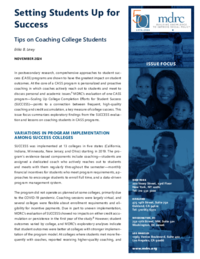Setting Students Up for Success
Tips on Coaching College Students

In postsecondary research, comprehensive approaches to student success (CASS) programs are shown to have the greatest impact on student outcomes. At the core of a CASS program is personalized and proactive coaching in which coaches actively reach out to students and meet to discuss personal and academic issues.[1] MDRC’s evaluation of one CASS program—Scaling Up College Completion Efforts for Student Success (SUCCESS)—points to a connection between frequent, high-quality coaching and credit accumulation, a key measure of college success. This issue focus summarizes exploratory findings from the SUCCESS evaluation and lessons on coaching students in CASS programs.
Variations in Program Implementation Among SUCCESS Colleges
SUCCESS was implemented at 13 colleges in five states (California, Indiana, Minnesota, New Jersey, and Ohio) starting in 2019. The program’s evidence-based components include coaching—students are assigned a dedicated coach who actively reaches out to students and meets with them regularly throughout the semester—monthly financial incentives for students who meet program requirements, approaches to encourage students to enroll full time, and a data-driven program management system.
The program did not operate as planned at some colleges, primarily due to the COVID-19 pandemic. Coaching sessions were largely virtual, and several colleges were flexible about enrollment requirements and eligibility for incentive payments. Due in part to uneven implementation, MDRC’s evaluation of SUCCESS showed no impacts on either credit accumulation or persistence in the first year of the study.[2] However, student outcomes varied by college, and MDRC’s exploratory analyses indicate that student outcomes were better at colleges with stronger implementation of the program model. At colleges where students met more frequently with coaches, reported receiving higher-quality coaching, and were sent messages about the importance of full-time enrollment—all components of the SUCCESS model—the program was linked to higher credit accumulation.
Lessons for Colleges
MDRC’s exploratory analyses provide useful information for the field and three main lessons for colleges looking to implement coaching as part of a CASS approach.[3]
- The quality of coaching sessions matters. The study found a link between students’ success outcomes and the quality of their coaching sessions (as ranked by the students). Students were surveyed about whether (1) they were generally satisfied with their coaching sessions; (2) their academic advising sessions provided accurate information about courses, programs, and requirements; (3) they received reminders from coaches about institutional deadlines (such as drop/add periods, withdrawal deadlines, and registration periods); (4) a coach was available when needed; and (5) they had sufficient time to meet with academic advisors or coaches.
- Frequent meetings help students stay on track. Traditional college academic advising is ad hoc, rare, and done on a drop-in basis—occurring once or twice per semester with whichever staff person is available. In the schools implementing SUCCESS, students averaged 16 contacts with a coach (including in-person and video meetings, phone calls, emails, texts, and social media interactions) in the first year; however, the number varied significantly by college. The program’s average estimated impact on cumulative credits earned goes up 0.94 credits for every five additional meetings students had with a coach. This finding is consistent with findings from other CASS programs that MDRC has evaluated.[4]
- Coaches should frequently contact students about the benefits of full-time enrollment. There is an association between students who reported they “often” or “very often” heard college faculty or staff members speak about the importance of enrolling in school full time and greater levels of academic access. Though not all students can enroll full time, evidence points to the importance of clear messaging on the benefits of full-time enrollment.
In conclusion, exploratory findings from the SUCCESS evaluation and other research on CASS programs that include personalized, proactive coaching point to three best practices for improving student outcomes: offering high-quality coaching (as ranked by students), scheduling frequent meetings, and sending consistent messages that encourage students to enroll full time.
The research reported here was supported by the Institute of Education Sciences, U.S. Department of Education, through Grant R305A210276 to MDRC. The opinions expressed are those of the authors and do not represent views of the Institute or the U.S. Department of Education.
[1] Some colleges use the term “advisors” or “navigators” to describe this role. For simplicity, this issue focus uses the term “coaches” to apply to the people in these roles.
[2] Colleen Sommo, Austin Slaughter, Cyrette Saunier, Susan Scrivener, and Kayla Warner, Varying Levels of Success (New York: MDRC, 2023).
[3] While the analyses cannot confirm a causal link between these lessons and a positive impact on credits earned, they can contribute to the discussion and understanding of how to best offer coaching in CASS programs.
[4] MDRC analyses of three other programs with personalized, proactive coaching or advising found positive impacts on credit accumulation and degree completion. See Colin Hill, Colleen Sommo, and Kayla Warner, From Degrees to Dollars: Six-Year Findings from the ASAP Ohio Demonstration (New York: MDRC, 2023); Alyssa Ratledge, Colleen Sommo, Dan Cullinan, Rebekah O’Donoghue, Marco Lepe, and Jasmina Camo-Biogradlija, Motor City Momentum: Three Years of the Detroit Promise Path Program for Community College Students (New York: MDRC, 2021); and Susan Scrivener, Michael J. Weiss, Alyssa Ratledge, Timothy Rudd, Colleen Sommo, and Hannah Fresques, Doubling Graduation Rates: Three-Year Effects of CUNY’s Accelerated Study in Associate Programs (ASAP) for Developmental Education Students (New York: MDRC, 2015).







